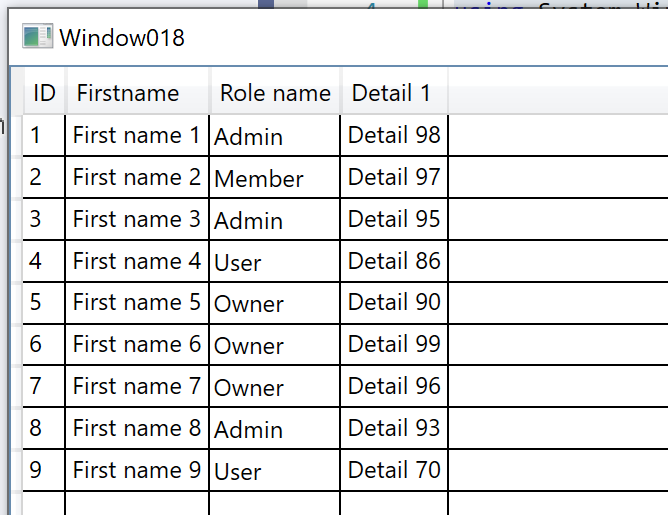2,854 questions
Hi Igor,
you can extend Person class via partial keyword to add property with reference to PersonDetail.
Try following demo:
XAML:
<Window x:Class="WpfApp1.Window018"
xmlns="http://schemas.microsoft.com/winfx/2006/xaml/presentation"
xmlns:x="http://schemas.microsoft.com/winfx/2006/xaml"
xmlns:d="http://schemas.microsoft.com/expression/blend/2008"
xmlns:mc="http://schemas.openxmlformats.org/markup-compatibility/2006"
xmlns:local="clr-namespace:WpfApp018"
mc:Ignorable="d"
Title="Window018" Height="450" Width="800">
<Window.Resources>
<local:ViewModel x:Key="vm"/>
</Window.Resources>
<Grid DataContext="{StaticResource vm}">
<DataGrid ItemsSource="{Binding Persons}" AutoGenerateColumns="false">
<DataGrid.Columns>
<DataGridTextColumn Header="ID" Binding="{Binding PersonId}"/>
<DataGridTextColumn Header="Firstname" Binding="{Binding FirstName}"/>
<DataGridComboBoxColumn Header="Role name"
IsReadOnly="True"
ItemsSource="{Binding Roles, Source={StaticResource vm}}"
SelectedValueBinding="{Binding RoleId}"
SelectedValuePath="RoleId"
DisplayMemberPath="RoleName"/>
<DataGridTextColumn Header="Detail 1" Binding="{Binding Detail.Detail_1}"/>
</DataGrid.Columns>
</DataGrid>
</Grid>
</Window>
Code:
using System;
using System.Collections.Generic;
using System.Linq;
using System.Windows;
namespace WpfApp018
{
public class ViewModel
{
public ViewModel()
{
Random rnd = new Random();
for (int i = 1; i < 10; i++) colPersons.Add(new Person() { PersonId = i, FirstName = $"First name {i}", RoleId = rnd.Next(1, 5) });
colRoles.Add(new Role() { RoleId = 1, RoleName = "Admin" });
colRoles.Add(new Role() { RoleId = 2, RoleName = "User" });
colRoles.Add(new Role() { RoleId = 3, RoleName = "Member" });
colRoles.Add(new Role() { RoleId = 4, RoleName = "Owner" });
for (int i = 1; i < 100; i++) colPersonDetails.Add(new PersonDetail() { PersonDetailId = i, PersonId = rnd.Next(1, 10), Detail_1 = $"Detail {i}" });
//
// connect data items
foreach (var person in colPersons)
{
var req = from det in colPersonDetails where det.PersonId == person.PersonId orderby det.PersonDetailId descending select det;
if (req.Count() > 0) person.Detail = req.First();
}
}
private List<Person> colPersons = new List<Person>();
private List<Role> colRoles = new List<Role>();
private List<PersonDetail> colPersonDetails = new List<PersonDetail>();
public List<Person> Persons { get => colPersons; }
public List<Role> Roles { get => colRoles; }
}
public partial class Person
{
public PersonDetail Detail { get; set; }
}
public partial class Person
{
public int PersonId { get; set; }
public string FirstName { get; set; }
public int RoleId { get; set; }
}
public class Role
{
public int RoleId { get; set; }
public string RoleName { get; set; }
}
public class PersonDetail
{
public int PersonDetailId { get; set; }
public int PersonId { get; set; }//FOREIGN KEY TO TABLE PERSON
public string Detail_1 { get; set; }
}
}
Result:


